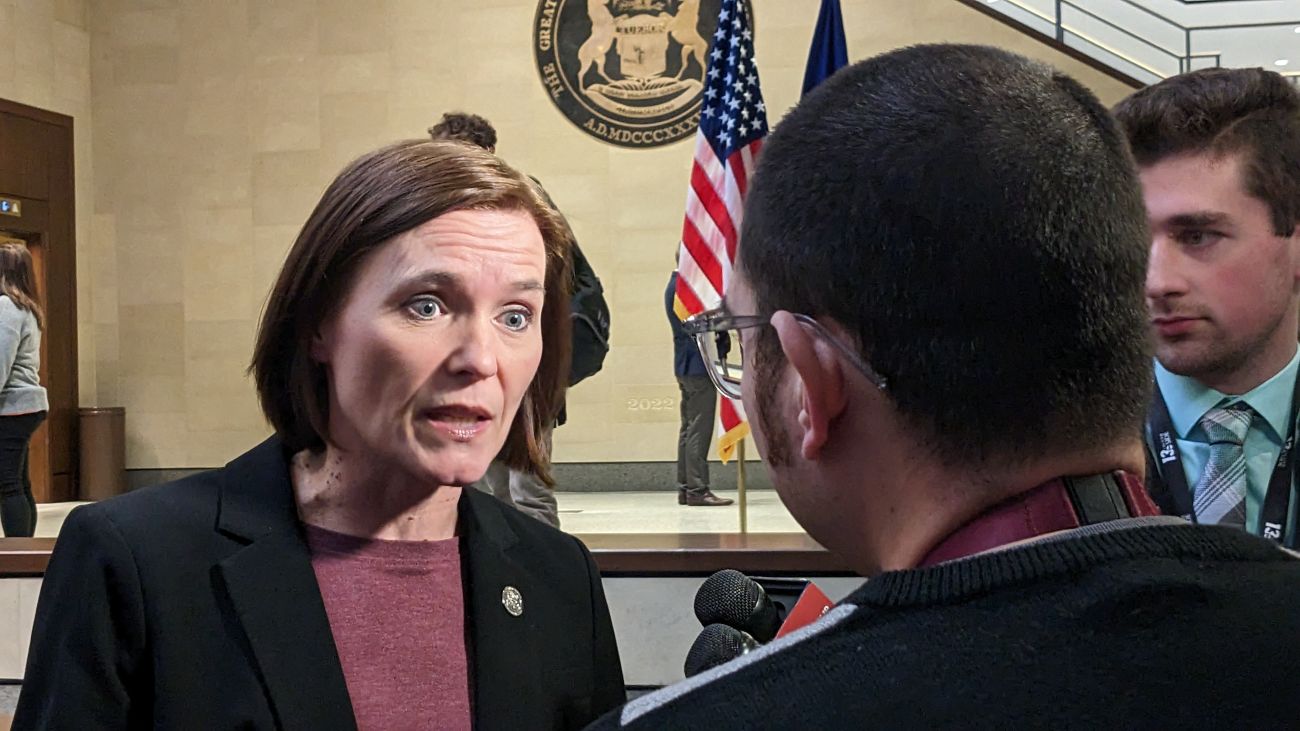Michigan Senate OKs hate crime, birth control access bills in marathon final push

- Michigan's Democratic-led Senate passes slew of bills in marathon 29-hour session to close out the legislative year
- Legislation approved includes greater charter school transparency requirements, contraceptive coverage, public worker benefits
- House adjournment killed many other Senate-approved bills
LANSING — The Michigan Senate worked through the night Thursday, finalizing proposals to toughen hate crime laws, expand contraceptive access, increase public worker benefits and more in a record 29-hour session that concluded Friday afternoon.
Majority Senate Democrats sought to approve and send Michigan Gov. Gretchen Whitmer as many bills as possible in what was likely the final round of voting for the state’s first Democratic trifecta in four decades.
Republicans, meanwhile, delivered lengthy speeches in an attempt to slow Democrats from passing bills, some of which had not been vetted in committee and could not be amended because the House had adjourned.
Related:
- Michigan House kills hundreds of bills. See what died on final day of Dem control
- Michigan transparency plans die again, keeping public in the dark
- Michigan lame-duck Legislature: House ends year with tears, fingerpointing
Senate Minority Leader Aric Nesbitt, R-Porter Township, called it a “ridiculous process” and quoted Democratic colleagues who had criticized rushed lame-duck policy making when Republicans controlled the Legislature.
The Senate flurry came after the House called it quits for the year Thursday afternoon amid a boycott by all Republicans and one Democrat. That left Senators in the lurch, effectively killing hundreds of Senate-approved policy bills, including greater government transparency, further firearm restrictions and anti-voter suppression efforts.
Senate Majority Leader Winnie Brinks, D-Grand Rapids, said she was “deeply disappointed” in the House but on Thursday night had pledged to continue work in her chamber.
“We have the opportunity to do good – a lot of good,” she said in a Thursday evening statement, vowing that "residents can count on us to act on key items that will protect the state’s children, improve on-the-job rights for workers, and more.”
Senate Democrats then attempted to salvage various legislative efforts, voting on scores of bills that had already passed the House and did not need further action before heading to Whitmer for her potential signature.
Whitmer earlier this month warned lawmakers they should not expect her to sign off on their legislation if they were unable to deliver votes on two of her top priorities: economic development and road funding.
While a Senate panel gave the final OK to $247 million in state subsidies Wednesday, lawmakers did not finalize any economic development legislation, and road funding was notably absent from House and Senate agendas.
Still, Senate Democrats seemed confident Whitmer would sign the pile of bills they sent her, including:
Gun safe storage information
Building off the state’s new gun safe storage law, Senate Democrats gave final approval to bills that would require Michigan schools to provide information about the firearm storage rules to parents each academic year.
The state health department would have to develop an informational notice regarding best practices for firearm storage and provide it to all public and nonpublic schools for distribution by October of 2025.
The bills passed along party lines, with all Republicans voting in opposition.
State Sen. Jim Runestad, R-White Lake, said in a speech he did not believe the proposal would improve student safety but instead “create an inordinate fear of firearms, which bullies and intimidates parents.”
In response, state Sen. Mallory McMorrow, D-Royal Oak, said the intent of the bill was to “simply require that information be created and sent home with students to alert them of Michigan's safe storage laws, as well as information on where parents could get access to free locks.”
Tougher penalties for hate crimes
Senate Democrats signed off on legislation that would write stricter hate crime prohibitions into Michigan law.
The proposal, sponsored by Democratic Rep. Noah Arbit of West Bloomfield, seeks to update a 1988 law banning “ethnic intimidation” of race, religion, gender or national origin to include hate crimes based on sexual orientation, gender identity or expression, disability or age.
Sen. Jeremy Moss, a Southfield Democrat, on Friday morning cited recent attacks on Jewish people in Michigan — including University of Michigan regent Jordan Acker, whose home was vandalized this month — as reason enough to support the legislation.
"I've had friends on both sides of the aisle talk to me about all of the events over the last year and a half, and have expressed genuine concern for my personal welfare and the welfare of my community, and have asked, What can we do about it?” Moss told fellow lawmakers. “This bill is what you can do about it."
Republicans opposed the legislation. Runestad, the White Lake Republican, unsuccessfully sought an amendment to clarify that anyone making a false allegation would be subject to prosecution.
“There are countless cases of false allegation, especially regarding hate crimes, that were not followed up with prosecution,” he claimed in a Friday floor speech.
Birth control access
In another round of party-line votes, Senate Democrats approved bills that aim to ease access to various birth control methods by allowing pharmacists to prescribe contraceptives, in addition to other medical professionals.
The plan would also rewrite the state insurance code to require coverage of pharmacist-prescribed contraceptive hormonal patches, vaginal rings or other self-administered hormonal contraception – such as birth control pills.
Supporters say allowing pharmacists to prescribe contraceptives and requiring insurers to cover them is important given Michigan’s shortage of obstetricians and gynecologists, which one-third of all counties lack.
Under the bills, the Department of Licensing and Regulatory Affairs (LARA) would need to create specified rules, with the help of the state Board of Pharmacy, within 18 months of when the bill takes effect. LARA and the pharmacy board would also need to develop a self-screening risk assessment tool for individuals seeking a contraceptive prescription
In voting against the package, Sen. Kevin Daley, R-Lum, said he was opposed to the effort because “a kid can go in and get these prescriptions filled” as there is no parental consent required under the bills.
"It's hard to believe that we're having this discussion,” he added.
Easing name change process
People hoping to change their name would have an easier time doing so under House-backed legislation that passed the Senate early Friday morning.
As written, the bills remove some requirements currently needed to undertake a name change — such as foregoing a hearing process — and alter accepted reasons for a needed legal name change to include gender identity and being a survivor of domestic violence, human trafficking or sexual assault.
Runestad, the White Lake Republican, opposed the package, saying in a floor speech the bills did not do enough “to ensure a person's criminal history follows them when they petition the court for a name change.”
Another part of the package would remove the legal need to show sex-reassignment surgery occurred to change a person’s gender marker on their state license. A new birth certificate would be issued under the bill and a person could request to have their original birth certificate sealed.
They also could change the gender marker on their driver’s license or state identification card to M for male, F for female or X for nonbinary, codifying current practice at the Secretary of State into Michigan law.
Erin Knott, executive director of LGBTQ advocacy group Equality Michigan, touted the passage as a win for transgender residents, saying in a statement the bills “help ensure trans Michiganders can access accurate names and identity documents into the future.”
Gun buybacks
A trio of bills requiring the destruction of any firearms collected through gun buyback programs earned final approval Friday morning along partisan lines.
Taken together, the legislation would overhaul the Michigan State Police’s gun buyback program, which allows gun owners to voluntarily relinquish them.
Law enforcement would be prohibited from reselling any firearms purchased and turned over by municipalities through buyback programs and would need to destroy them.
The legislation comes after a New York Times investigation found that the Michigan State Police was a client of a firearms disposal company that stripped guns for parts and resold them. Following the investigation, the department began working with a scrap metal processing facility to destroy firearms using an industrial pulverizer.
Senate Republicans slammed the legislation as an attack on Second Amendment rights and limited law enforcement options, arguing it wasn’t the right way to reduce violence in communities.
“The notion that destroying confiscated firearms will somehow lead to a safer society is a liberal fallacy,” Sen. Michele Hoitenga, R-Manton, said Friday.
Cheaper healthcare for public employees
House-approved legislation finalized by the Senate in a party-line vote at 6:41 a.m. would increase the amount that public employers can pay toward employees’ medical benefit plans, reducing costs for workers.
That includes state and local governments, schools, community colleges and public universities. The plan would effectively lift a healthcare contribution cap signed into law by then-Gov. Rick Snyder in 2011.
The proposal is backed by the Michigan Education Association, who last week called it "a critical step in reigning in skyrocketing health care costs for Michigan teachers and school support staff.”
Republicans railed on the legislation, warning it will increase costs ultimately paid by taxpayers.
“This bill is going to massively increase the cost associated with these benefits,” said Sen. Jonathan Lindsey, R-Coldwater, who argued it will do little to benefit students.
Retirement benefits boost for corrections officers
Passed with bipartisan support Friday morning in a 25-13 vote, the legislation would allow corrections officers, conservation officers and other law enforcement officers to participate in the state police retirement plan, which is a hybrid plan with both pension and 401k-style components.
Supporters say it could help boost staffing, recruitment and attention, helping to reduce existing shortages, particularly in Michigan prisons.
"We're in a crisis mode at so many of our facilities, a crisis that I believe this bill helps to address," said Sen. Ed McBroom, R-Vulcan, who called the proposal a good first step to address the larger problem.
Boosting retirement benefits for corrections, conservation and other eligible officers would cost the state between $20.0 million and $37.8 million a year, according to an analysis by the House Fiscal Agency.
Sen. Thomas Albert, R-Lowell, warned the plan would likely create new unfunded liabilities for the state, which is still working to pay off long-term costs in other retirement systems.
"There is nothing in this proposal, which looks to learn from the experiments of the past, and avoid the same mistakes. We are doing the same thing and expecting different results, which is the definition of insanity."
School safety
Bipartisan legislation aimed at standardizing school safety requirements in the aftermath of the Oxford High School mass shooting cleared the Senate early Friday morning.
Lawmakers approved a group of House bills that would establish a standardized terminology for what constitutes certain emergencies, such as lockdown during threats in a school building, “secure mode” in the event of potential threats and “shelter in place” when conditions like severe weather make staying in a school building safer than going outside.
Other bills in the package would create a School Safety and Mental Health Commission to offer recommendations for improving mental health supports and other measures to help youth at risk of suicides or other behavioral health issues.
The commission would need to have representation of school mental health experts, teachers, law enforcement, parents and a current high school student or recent graduate.
Charter school reforms
A proposal to increase charter school transparency was met with staunch Republican opposition as Senate Democrats gave final approval to bills that would require public school academies to publicly disclose their authorizing body and primary education management organization.
Among other things, the bills would require the board of directors of a public school academy, a school of excellence, a strict discipline academy, or an urban high school academy to list that information on its web page, student applications, promotional materials and property signage.
Senate Minority Leader Aric Nesbitt, R-Porter Township, slammed the legislation as “another partisan, left-wing attack on alternative educational institutions” and on the “very essence of educational choice and innovation.”
Child labor restrictions
Senators also approved legislation changing the state’s process for issuing work permits to minors and restricting the number of hours minors can work when school is in session.
Sponsored by Rep. Phil Skaggs, D-Grand Rapids, the legislation would create a statewide online registration system under the Department of Labor and Economic Opportunity for employers and minors or their legal guardians. The move would shift the administrative tasks involving youth work permits away from school districts.
Under the legislation, 14- and 15-year olds could work a maximum of 40 hours a week between 7 a.m. and 9 p.m. when school isn’t in session, but would be restricted to a maximum of three hours per day and 18 hours per week between 7 a.m. and 7 p.m. during the school year.
Older teens could still request approval to work later hours under certain circumstances, but the bill as written would prevent any minor from working between 12 a.m. and 5 a.m. or allow them to work a job that is hazardous to their health or well-being.
Supporters have argued the change would streamline the system and help the state keep tabs on potential violations. The bill passed along partisan lines, 20-18.
Albert, the Lowell Republican, said he appreciated the intent of the legislation but remains unconvinced that “adding bureaucracy would have prevented any recent high-profile cases involving violation of the law.”
Petition drive changes
Efforts to reform Michigan petition drives also sailed through the Senate late Thursday night.
While not as expansive as a separate effort that died with House adjournment, the package does change state law regarding how the Michigan Board of State Canvassers can sample and count gathered signatures.
Democrats said canvassers recommended the changes. Republicans called the bills a partisan rush job. Among other things, the package would:
- Allow a person’s signature be counted once in canvassing efforts should they sign a petition twice. Current Board of State Canvassers guidance disqualifies both signatures.
- Require a petition form to include a petition circulator certification
- Prescribe specific text formatting requirements for petitions to amend the state constitution, initiative legislation or hold referendums
- Require canvassers refer any obviously fraudulent signature to the Department of Attorney General for further investigation
- Require the Secretary of State to list publicly and update the status of a submitted petition on the first business day of every month after the date a petition and signatures were filed
- Delete a provision barring circulators from gathering more than 15% of a petition's signatures from people in the same congressional district
- Allow canvassers to use random sampling to determine the validity and sufficiency of petition signatures, codifying recent practice
Motherhood mortality improvements
From deleting quarterly requirements to screen breast milk for HIV to providing blood pressure monitors for pregnant or post-partum women, a nine-bill package that aims to improve Michigan’s maternal mortality rates was one of the few bill packages to make it out of the Senate by Thursday night.
If signed by Whitmer, the package would require:
- The state Department of Health and Human Services (DHHS) to create a “perinatal quality collaborative,” codifying into state law an existing program supported by federal dollars
- Health insurance companies operating in Michigan to cover individually-fitted blood pressure monitors for pregnant or post-partum mothers. These monitors could still be subjected to a deductible or co-pay
- Health professionals to offer mental health screenings to postpartum women during their child’s four- and eight-week checkups, as well as their six- and 18-month checkups
- DHHS officials establish and implement a program registering perinatal facilities by rank — from one to four, basic care to specialty and regional care — to indicate the level of care they’re capable of providing
- DHHS and the state Department of Insurance and Financial Services officials to make hospitals provide an informational document regarding the insurance enrollment process for covering a newborn.
All of the bills except one passed out of the Senate with bipartisan support and without debate. The only bill in the package that did not get bipartisan support, the perinatal facility rankings bill, passed along party lines.
The legislation is not to be confused with the Senate-backed “momnibus” package, which also sought to improve maternal mortality rates — specifically for Black and Brown mothers. That effort died in the House when it adjourned Thursday.
See what new members are saying about why they donated to Bridge Michigan:
- “In order for this information to be accurate and unbiased it must be underwritten by its readers, not by special interests.” - Larry S.
- “Not many other media sources report on the topics Bridge does.” - Susan B.
- “Your journalism is outstanding and rare these days.” - Mark S.
If you want to ensure the future of nonpartisan, nonprofit Michigan journalism, please become a member today. You, too, will be asked why you donated and maybe we'll feature your quote next time!




